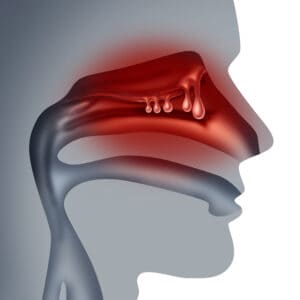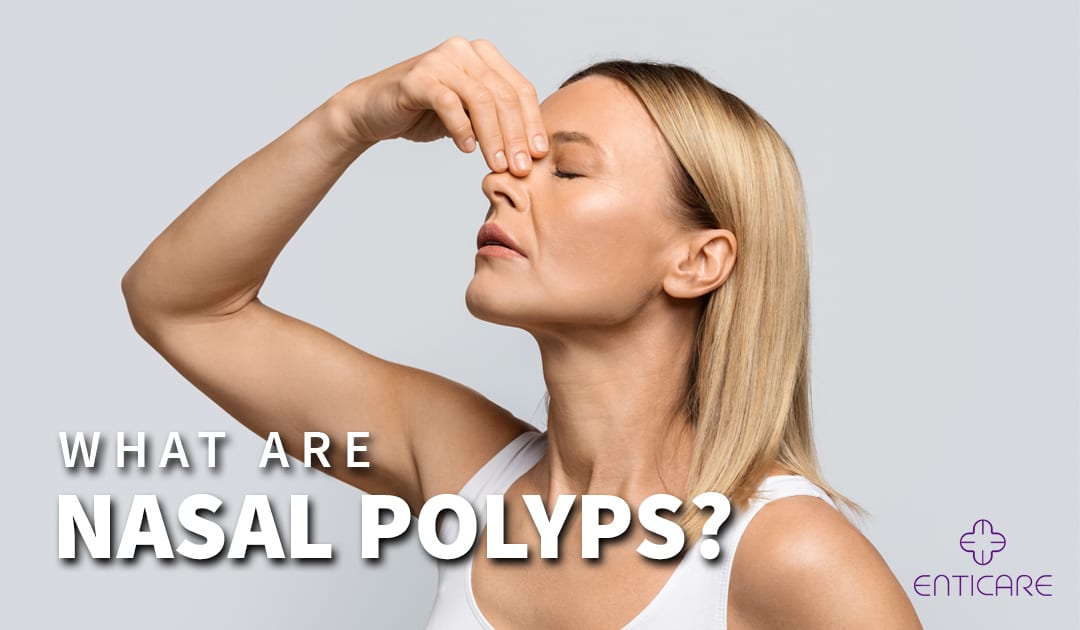Nasal problems can disrupt your daily life, making it challenging to breathe freely. Dive into the world of nasal congestion and nasal polyps with this informative blog, where you’ll discover the solutions you’ve been searching for.
Find Relief from Nasal Congestions and Nasal Polyps
Nasal polyps and nasal congestion are distinct. While nasal congestion can result from various factors like allergies, infections, and irritants, it’s also a common symptom of nasal polyps. These painless, noncancerous growths develop in the lining of the nose or sinuses, causing symptoms such as a runny nose, postnasal drip, and a diminished sense of smell. From understanding the causes to recognizing the symptoms, we’ve got you covered.

Facial image with Nasal Polyps
Causes and Risk Factors
The exact cause of nasal polyps remains unclear, but experts believe that chronic inflammation of the nasal passages and sinuses plays a significant role. Some common risk factors include:
- Chronic sinusitis: Individuals with recurring or long-lasting sinusitis face an increased risk of developing nasal polyps.
- Allergic rhinitis: Chronic allergic inflammation can contribute to the formation of nasal polyps.
- Asthma: People with asthma are more prone to nasal polyps due to shared inflammatory pathways.
- Aspirin sensitivity: A small percentage of individuals with nasal polyps may develop symptoms when taking aspirin or nonsteroidal anti-inflammatory drugs (NSAIDs).
- Genetic predisposition: There’s evidence to suggest that certain genetic factors may make some individuals more susceptible to developing nasal polyps.
Diagnosis and Treatment Options
If you suspect nasal polyps, consult a healthcare professional for an accurate diagnosis. The diagnostic process typically involves a thorough medical history assessment, a physical examination, and potentially additional tests, such as:
- Nasal endoscopy: This procedure involves using a small, flexible tube with a light and camera to visualize the nasal passages and sinuses.
- Imaging tests: CT scans may be performed to provide detailed images of the nasal and sinus structures.
Treatment Options
The treatment of nasal polyps aims to reduce inflammation, alleviate symptoms, and improve nasal airflow. The approach chosen depends on the severity of the condition:
- Medications: Healthcare providers often prescribe nasal corticosteroids to reduce inflammation and shrink polyps. In some cases, short-term relief may be achieved through oral corticosteroids. Additional medications like antihistamines or antibiotics may be prescribed to manage associated symptoms or infections.
- Nasal Irrigation: Regular saline nasal irrigation helps remove mucus, reduce congestion, and maintain nasal health.
- Allergy Management: For those with allergic rhinitis as a contributing factor, identifying and avoiding allergens, along with appropriate allergy medications and immunotherapy, can help manage nasal polyps.
- Surgical Intervention: In cases of larger or persistent polyps unresponsive to conservative treatments, endoscopic sinus surgery may be recommended. This procedure involves removing polyps and correcting underlying anatomical abnormalities.
- Follow-up Care: Nasal polyps have a tendency to recur. Regular follow-up appointments with an ear, nose, and throat (ENT) specialist are essential for monitoring the condition and adjusting the treatment plan as needed.
Reclaim Your Breathing Comfort
Don’t allow nasal congestion and nasal polyps to restrict your life. Explore common symptoms like stuffiness and loss of smell, and learn about your options for relief, including medications, nasal irrigation, and even surgical intervention.
Take the First Step Towards Clear Breathing
Bid farewell to nasal discomfort. Contact our team today to receive a personalized treatment plan that addresses both nasal congestion and nasal polyps. Reach us at 480-214-9000 and embrace the freedom to breathe once again.

